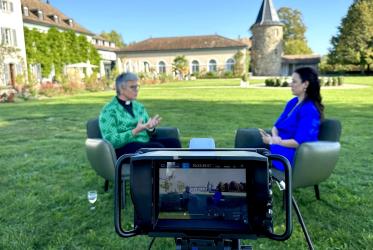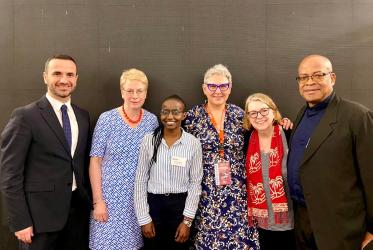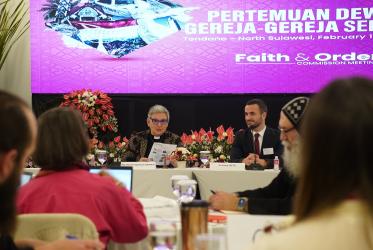Dear Sisters and Brothers in Christ,
It is my honour and pleasure to extend to you my warm greetings during this 21st World Assembly of DIAKONIA. You are gathered with the most ambitious theme - and the most needed theme of today. The theme for your gathering, “Diaconia – Healing and Wholeness for the World”, reflects the specific calling of the Christian Church. Not less, rather more, than before, the specific contribution from the Christian church in a world faced with so many challenges, calling on the very best of human contributions, ours should be a sign of how religion as faith, community and practice is a way towards healing and wholeness. Our themes, our perspectives must be ambitious. The theme of the upcoming 10th Assembly of the World Council of Churches, to be held in Busan, Korea this year, is: God of life, lead us to justice and peace!
People without dreams are dangerous. We are called to give account of our hope. You, we, must be ambitious and humble, called to bring the justice and peace of God to the world today.
As we and the whole world accompany President Nelson Mandela in our thoughts and prayers these days, we remember that sometimes healing and wholeness requires a lot, more than we can understand, that it is nevertheless possible, even when it as a long way towards freedom and healing. He is the strongest sign of how human beings can contribute to justice, healing and reconciliation in our time. We in the WCC also remember how he acknowledged the values of the churches conveyed to him by the missionaries and supporting him by the work of the ecumenical movement as he addressed our 8th Assembly in Harare, 1998.
I greet you in the name of the World Council of Churches, a fellowship of churches calling one another to unity - so that the world may believe, as Christ prayed and prays for us all. Inspired by your theme I would like take this opportunity to share some reflections how the call to unity is a call to diakonia, to a common service for healing and wholeness. You are representing the ministry of diakonia around the world, and it is my deepest conviction that the churches need you and that the ecumenical movement needs you, as the world needs you.
As usual, we prepare a statement about our call to unity for every assembly, also this, the 10th assembly. This time we have prepared a statement about how the call to unity is a call to life, together in justice and peace. Unity both requires justice and promotes peace. Reflecting on the latest document (published this year after 20 years of deliberations) from Faith and Order, the theological work of the WCC for Christian unity, we - and you - should find inspiration to this reflection. The Church - Towards A Common Vision conveys a picture of the Church as a sign and foretaste of the coming kingdom of God, and the Church as a servant to the world. We - and I appeal to you to contribute to this vision - do believe that the church divisions can be healed and be a healing community, as a sign for the world. Unity is an expression of life in fellowship that only can be realised through both words and actions bringing healing and making us whole. Together we pray and work for expressions of such unity in our daily challenges of life, in our personal relations and in the relations between peoples, churches, religions and nations.
In our reflections about unity for the 10th Assembly, we try to be both honest and ambitious. So much is still divided and dividing, destructed and destructive. However, we also harvest the fruits of the work of the churches together. One of the signs of our time is really that we, in a wider sense than ever, share as our common ecumenical conviction that the church is called to promote justice and peace, healing and wholeness. I sometimes observe how some actors who criticised the WCC for our commitment to work for justice, e.g. The programme to combat racism and our inter-faith programme, now are advocates with us for human rights, for the care of creation, and for reconciliation with peoples of other faiths. God is uniting us in a new way in the call to justice and peace, to healing and wholeness. I ensured Pope Francis, when we met briefly the day after his installation, that the programme of his name is a significant inspiration to the whole ecumenical movement searching for healing, justice and peace.
However, we have no reason to fear that there will be no need of the diakonical work of the church, neither the ecumenical work of the churches. Each day we see in our neighbourhood and in the news headlines life that needs healing and reports of calamities that threaten life in our different communities around the world. It often seems that there is no place on earth that is at peace, no place of refuge, no place of sanctuary. In all our societies we hear the cries of pain and loss, as well as the angry cries of desperation and hopelessness. In such a world, who can give hope? In such a world, what can bring healing? In such a world, what is the wholeness that can mend the tears and restore life?
The Christian church has a specific responsibility to respond to the suffering of this world with loving compassion. This is because we are the body of Christ, the one who was came into this world not be served but to serve and to give his life as a ransom for many.” (Matthew 20:28, Mark 10:45) This ministry of service that we have been called to bear, diakonia, is one of the five marks of being church in the world today, along with liturgia, worship; koinonia, fellowship: didache, education; and martyria, witness. These five marks are not individual pillars that stand on their own, but rather are like concentric circles that come together to form the petals of a flower with Christ at the center. Therefore, our ministry of diakonia is not, and indeed cannot, be divorced from the other marks of being church. It is part of the holistic expression of being church and also is, in itself, a full testimony of the good news of God’s reign breaking into this world. As the participants of th global meeting on diakonia organised by the WCC recognised, “Every Christian community in every geo-political and socio-economic context is called to be a diaconal community, witnessing to God’s transforming grace through acts of service that hold forth the promise of God’s reign” healing relationships and nurturing partnerships “for the sake of God’s good creation.”
The ministry of diakonia that the church undertakes has four distinct roles or functions, what I here call the four P's. The first role is that of Priestly service. There is no stronger sign of solidarity, deep personal solidarity, than prayer for others. By engaging with the pain and suffering of this world through prayer the church takes upon itself the responsibility of mediating the pain, the frustration, the hopelessness, the tears and the cries of the world. Through its engagement it reveals for the world to see and know that God is not ignorant or adverse to the world’s suffering. To be honest, all of us need the prayers of others. I could not understand how to do my ministry without knowing that somebody pray for me, some of them sisters and brothers of different orders. By its presence and participation in the suffering realities of this world the church stands between God and the world as a priest in the model of Jesus, our great high priest who gave himself and prayed for the world, and for us, as the ultimate sacrifice in service of reconciling and healing a broken world.
The second role or function of the church’s diakonia is that of the seeing and caring Pastoral service. During a recent meeting organised by the WCC on diakonia the participants affirmed that diakonia is “a response in faith to the hope of the coming reign of God” which is dynamic, contextual and versatile. Diakonia, as an expression of this faith, embodies the signs of God’s reign and makes it visible in all experiences of hope amidst turmoil, in actions that heal and nurture people and relationships and in struggles that seek justice and affirm truth.
We have traditionally regarded diakonia as the Christian response to people in need as well as situations of crisis. The diakonia of the church has been characterised by actions of reaching out to the suffering and marginalised from locations of power and privilege, with resources and infrastructure. This can be referred to as the pastoral diakonia of the church, binding the wounds of the injured, feeding the hungry, and restoring the dignity of the destitute and victimised. However, the recent work of the WCC in developing a theological perspective of diakonia has noted that “Jesus announces his diakonia as one that liberates the oppressed, opens the eyes that are blind, and heals the sick (Luke 4:16f).”
This vision of diakonia as expressed through the ministries of Jesus can be referred to as the Prophetic diakonia of the church. This is the third role or function of the church’s diakonia, that of prophetic service. It is the service of Christian witness in a world that names the evils, the powers and principalities that oppress, blind and wound all who are created in God’s image. The prophetic diakonia of the church is a diakonia that builds persons and communities, affirms the dignities of all people, and transforms cultures and practices that discriminate and abuse God’s creation and treats them as mere objects or commodities to be exploited for material gain, power and privilege. Our diakonia must fight for the rights of others, also the rights to access medical treatment when needed. If I have this right, why should not all have this right?
The diakonia that brings healing and wholeness for the world, then, is “service that makes the celebration of life possible for all.” It is “faith effecting change, transforming people and situations so that God’s reign may be real in the lives of all people, in every here and now.” Viewed in this way, diakonia becomes a “radical spirituality of struggle and commitment for transformation of sinful social structures, working with and advocating for the rights of people who have been made vulnerable by social and economic structures.”
However, the diakonia of the Christian church that offers healing and wholeness for the world is not merely resistance or confrontation. Such diakonia proposes specific “alternatives to the ways in which human beings relate with one another and with nature.” As such, in addition to being priestly (praying), pastoral and prophetic, it is also Professional, using our gifts and capacities to be transformative. This role or function of the church’s professional work, its contributions of diakonia for transformation, reflects who we are called to be as disciples of Christ. Jesus, our Servant Lord, called those who choose to follow him as his disciples “the salt of the earth, the light, and the leaven of the world.” (Matthew 5:13,14) As disciples, we are called to be agents, workers, of change and transformation. Empowered by the Holy Spirit, the church of this generation is called to resist the powers of destruction and injustices, conflicts and violence, by proposing alternative values and visions of the world. By embodying the values and vision of God’s Kingdom in its witness through service, the diakonia of the Christian church should heal, restore and reconcile this world with its Creator who is the ultimate foundation for fullness of life in health and wholeness.
We are called in our professional lives to be where we are needed, sometimes what others might find to be the wrong places or among the wrong people. You know that only human hybris can lead to that kind of thoughts; all human beings are from time to time - if not every day - in need of others and the care of others. Three examples of how the work for unity and dignity is connected: The ministry of diakonia for disabled people in the former GDR, supported also by diaconical institutions like this Johannesstiftung here in Berlin. The work of diakonia by the professional diaconical institutions of the Coptic orthodox church and of the Protestant churches in Egypt, offering real signs of healing and justice and peace. The passport controller in Washington, browsing my passport, asking why I only go to the "wrong places" in my professional life. We know - in different ways - where our "wrong places" are, where we are needed as professional workers and as churches.
As you deliberate and discuss the potential gifts that you have for being God’s agents of diakonia in the world today during these meetings I pray that the Spirit of God will open your eyes, liberate your hearts and strengthen your hands to reach out to each other in solidarity and to embrace the world with God’s love. May the experiences you share during the days ahead further refine and sharpen your understanding of being diaconal churches in the world today, the agents of Christ for priestly, pastoral, prophetic and professional transformative service.
Bringing healing and wholeness, justice and peace to this broken world.



